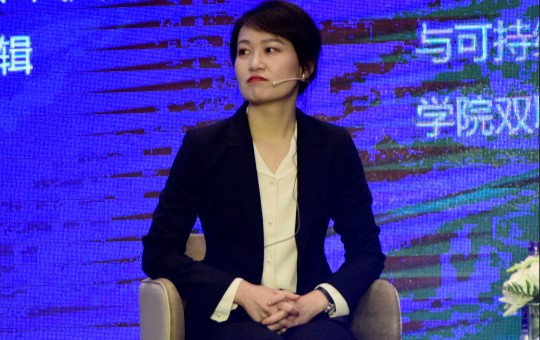On September 17th, 2018 Taiyuan Energy Low Carbon Development Forum "Urban Energy Low Carbon and Sustainable Development" sub-forum was held, in the "Government’s Bright Energy Salon" link, Professor Wang Ying, who is double hired by UNEP-Tongji Institute of Environment and Sustainable Development, interacted with other guests in the dialogue, the following is an excerpt from Wang Ying's speech:
In September 2015, leaders around the world in New York passed the United Nations 2030 agenda of sustainable development. It is the first time that sustainable development became the core of our agendas. After the Millennium Development Goals, the 2030 agenda not only focused on traditional issues, such as poverty reduction, education as well as women's and children's rights and interests but also put more emphasis on global challenges including environmental protection, climate change, and green economy. It pointed out the next phase of the common path and the objectives of the development for countries all over the world.
Sustainable development refers to development that meets the needs of the present without compromising the ability of future generations to meet their own needs. It is a joint effort to build an inclusive, sustainable and resilient future for mankind and the planet. To achieve sustainable development, three core elements must be harmonized: economic growth, social inclusion, and environmental protection. These factors are interrelated and are essential to the well-being of individuals and society. Among them, the concept of sustainability should be deeply rooted in people's hearts, and the responsibility of young people is very important. Education for sustainable development is a powerful foundation for the achievement of the UN 2030 Sustainable Development Goals and the development of leadership for sustainable development among young people.
Sustainable development, in fact, turns out to be the profound concept of sustainability for young talents to keep, and to attach equal importance to social benefits, environmental benefits, and economic benefits, which requires colleges and universities to put ideological and value education and engineering knowledge education on a par. "Only by wholehearted communication, can the education become long-lasting". Educational exchange is the foundation of a people-to-people bond, talent training supports Chinese international cooperation, and education provides a guarantee for promoting sustainable development.
Taking Tongji University as an example, we have organized a series of green and sustainable development course packages to be developed and applied to the teaching of various majors and constructed the green and sustainable development subject group. In the meantime, several international research centers have been established to study the frontier issues of sustainable development, and professors with specific responsibilities have been set up to teach relevant theories and practices. In addition, we also initiated the interdisciplinary minor of sustainable development, which is integrated with the knowledge of the United Nations Sustainable Development Agenda and online courses related to climate change, provided students with a second classroom to learn the integration of the concept of sustainable development and professional courses, and organically infused the education of the concept of sustainable development into the process of international engineering talent training.
The responsibilities and actions of Chinese youth in global sustainable development can be carried out in the following three aspects: First, integrate personal struggle into the tide of struggles for national rejuvenation, and combine patriotism with the sustainable development of the world. Only when young people have sunshine in their hearts, can they watch at distance in their eyes and have strength under their feet. Therefore, we should try our best to find the combination point with sustainable development in our own interest and profession, and benefit mankind through professional knowledge.
Secondly, actively participate in the global discussion on sustainable development, and create more communication platforms with innovative communication tools. More importantly, we should view the world from the perspective of appreciation, mutual learning, and sharing. We should promote exchanges and mutual learning among different civilizations and promote harmonious coexistence, and actively contribute to building a community with a shared future for mankind. Like in the One Belt And One Road Youth Creativity and Heritage Forum and the 9th UNESCO Youth Forum, Chinese youth should actively participate in it and seek wisdom together. For example, as the lead author of UNEP Geo-6 AP Youth, I organize and publish young people's own global environmental assessments. Understanding environmental problems from the perspective of young people, solving environmental problems, and publishing our Chinese young people's own opinions to the world, this report, as part of the Asia-Pacific regional report, is also part of the global report. This proves that young People in China have been integrated into the process of sustainable development step by step. I believe that our country will have a better future in the future.
Thirdly, we encourage young students to go out of school, go to the United Nation and speak out on behalf of China, or even become employees of the UN on behalf of China, and directly participate in the formulation and implementation of the UN 2030 Agenda for Sustainable Development. Young students representing the new generation of Chinese will play an increasingly important role on the international stage through international organizations' talent preparation programs and student observers of the United Nations General Assembly.
We look forward to the active participation of the young people in China to help the harmonious development of China's ecological civilization and its widespread development, so as to promote the early realization of the UN 2030 Sustainable Development Goals for all countries.
